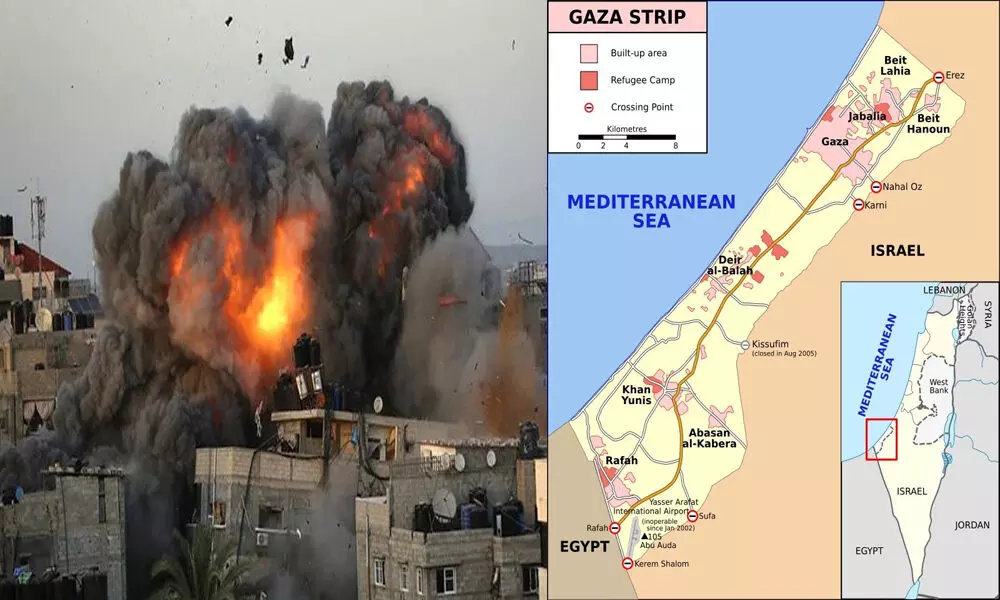Egypt's role key to Gaza and Arab world?
Egypt brokered the truce that ended the last Gaza war in 2014
image for illustrative purpose

IN the second week of the war between Israel and Hamas, President Joe Biden "expressed his support for a cease-fire" in a phone call with Prime Minister Benjamin Netanyahu. The president's passive phraseology betrays his reluctance to engage in the process. He isn't offering to broker a truce, or even proposing a road map toward one. He isn't suggesting a cessation of hostilities, much less demanding it. No, he's merely endorsing the idea.
What Prime Minister Benjamin Netanyahu thought of Biden's impuissant petition isn't hard to guess. Hours after the two men spoke on Monday, Israeli air force jets carried out dozens of strikes against targets in Gaza. The leadership of Hamas ordered another volley of rockets into Israel.
With Biden circumspect about committing American political and diplomatic resources to the effort, the heavy lifting of engineering a cease-fire falls once again to Egypt. For the government of President Abdel-Fattah El-Sisi, this is an opportunity to demonstrate Cairo's centrality to the major matters of contention in the Middle East.
It has been a long time coming. Egypt brokered the truce that ended the last Gaza war in 2014. But this was followed by a long period in which other actors took the center stage. Hamas turned to Qatar for cash, Iran for weapons and Turkey for political support. More recently, Israel found new allies in the Arab world by signing the Abraham Accords with the United Arab Emirates, Bahrain, Sudan and Morocco. Cairo was reduced to the status of junior partner in Arab coalitions, whether in the embargo against Qatar or the military campaign in Yemen against the Iran-backed Houthi rebels.
The American view of Egypt changed, too. Where President Donald Trump regarded Sisi as his "favorite dictator," Biden pledged there would be no more blank checks for a government that flagrantly abused human rights. This suggested Cairo couldn't bank on American support for foreign-policy issues that Egypt regards as existentially important, such as the dispute with Ethiopia over a giant dam on the Blue Nile.
But things have looked up for Sisi in the past few months. Relations with Turkey, after years of friction over Ankara's support for the Muslim Brotherhood, are on the mend. Egypt has become a pivotal player in the contest for the hydrocarbon resources under the Eastern Mediterranean. And if Sisi has found Biden lacking in warmth, he has a new best friend in France's President Emmanuel Macron.
All throughout, Egypt has kept up its connections in Gaza. Relations with Hamas improved in 2017, after the Islamist group broke its ties to the Muslim Brotherhood, Sisi's bete noire. They have waxed and waned since then, but have recently been on an upward trajectory, as Egypt has sought to broker a reconciliation between the various Palestinian factions.
For all the support it gets elsewhere, Hamas needs to stay in Cairo's good graces. With Gaza blockaded on three sides by Israel, Egypt is its only physical connection to the outside world. This gives Egypt what none of the other players in the Middle East has: direct relations with both Israel and Hamas. This is crucial to its chances of mediating the current conflict.
Soon after the recent fighting began, Sisi ordered the border crossing opened for injured Gazans to be brought to hospitals in Egypt, and for humanitarian aid to flow in the opposite direction. He pledged $500 million toward reconstruction. His government also opened communications with Ismail Haniyeh, the leader of Hamas, and sent mediators to Jerusalem. In contrast, the other Middle Eastern states — including the Arab signatories of the Abraham Accords — could only offer rhetorical support for the Palestinians, while the Biden administration issued bromides about Israel's right to defend itself.
Egypt's efforts, by themselves, will not produce a truce. The fighting will only stop when both belligerents reckon they have reached a point of diminishing returns, where the cost of fighting exceeds the military or propaganda gains. Whenever Israel and Hamas reach that stage, it will be to Egypt that they turn for mediation.
It will be a moment for Sisi to savor, while Joe Biden expresses his "support" from the sidelines. (Bloomberg)

